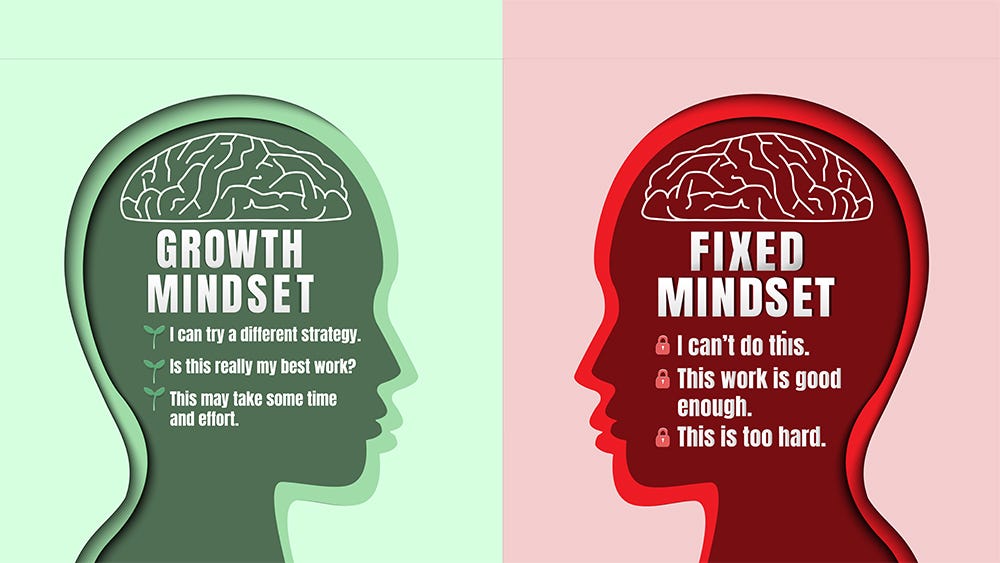
What separates those who reach their goals from those who stay stuck? It’s not just talent, luck, or intelligence. More often, it’s mindset. Caroline Goldsmith, a leading voice in personal development and therapy, has worked with individuals from all walks of life—from students to professionals—helping them overcome blocks and build fulfilling lives. Her work reveals a key pattern: those who succeed think differently. They don’t fear failure. They embrace it. They see challenges not as obstacles but as opportunities to grow.
In this guide, we’ll explore Caroline Goldsmith’s approach to developing a growth mindset, how it transforms your path to success, and how you can apply her strategies in your daily life.
What Is a Growth Mindset?
A growth mindset is the belief that abilities, intelligence, and talents can be developed through effort, learning, and perseverance. This idea contrasts with a fixed mindset, where people believe their qualities are set in stone.
Here’s a basic breakdown:
| Fixed Mindset | Growth Mindset |
| “I can’t do this.” | “I can’t do this yet.” |
| Avoids challenges | Embraces challenges |
| Gives up easily | Stays persistent |
| Threatened by others’ success | Inspired by others’ success |
Caroline Goldsmith teaches that adopting a growth mindset is essential for personal and professional success. It changes the way we think, react, and move forward in life.
The Psychology of Success According to Caroline Goldsmith
Caroline Goldsmith work is rooted in psychology and real human behavior—not just motivational slogans. Here are her core beliefs about how mindset shapes success:
1. Beliefs Shape Behavior
Caroline explains that what you believe about yourself influences your actions. If you believe you’re capable of change, you’ll take more risks, put in effort, and bounce back from setbacks.
2. Failure Is a Tool, Not a Threat
In Caroline’s sessions, failure is reframed as feedback. She encourages her clients to ask: “What did I learn?” instead of “What went wrong?”
3. Success Comes from Consistency, Not Perfection
People often get stuck thinking they need to be perfect. Caroline teaches that real success is about showing up, learning, and trying again—even when you don’t feel ready.
4. Mindset Is Learned, Not Born
No one is born with a growth mindset. It’s built over time, with practice and intention. Caroline helps people reshape limiting beliefs and rewire how they respond to setbacks.
Caroline Goldsmith’s 7 Strategies to Build a Growth Mindset
If you want to reach your full potential, it starts with how you think. Caroline offers these practical steps to shift from a fixed mindset to one focused on growth and progress.
1. Change Your Self-Talk
Your inner voice matters. Caroline encourages replacing negative thoughts like “I’ll never succeed” with empowering ones such as:
- “This is hard, but I can improve.”
- “I’m not there yet, but I’m learning.”
Awareness of language creates space for change.
2. Embrace the Learning Process
Instead of focusing only on the end result, Caroline helps clients find value in the process. Every mistake and challenge becomes a lesson.
Ask yourself:
- What did I learn today?
- How did I grow this week?
3. Set Progress-Based Goals
Rather than perfection, aim for improvement. Caroline recommends setting goals like:
- “Learn one new skill this month.”
- “Practice this task for 20 minutes daily.”
This reduces pressure and builds momentum.
4. Reframe Failure
In therapy sessions, Caroline helps clients list past failures and the lessons they brought. She teaches them to stop fearing failure and start seeing it as a natural part of growth.
One of her favorite reflections:
“I didn’t fail—I just found one more way that doesn’t work.”
5. Celebrate Effort, Not Just Results
Growth mindset is built by noticing and celebrating progress. Caroline teaches clients to reward consistency, persistence, and learning—not just outcomes.
For example:
“Even though I was nervous, I showed up and tried. That matters.”
6. Surround Yourself with Growth-Oriented People
Caroline encourages clients to build environments where growth is encouraged. That means:
- Being around people who push you to grow
- Avoiding toxic or overly critical voices
- Engaging in honest, supportive feedback
7. Keep a Growth Journal
Tracking your mindset can be powerful. Caroline recommends journaling:
- Daily challenges and how you responded
- Thoughts that held you back
- Wins you’re proud of, no matter how small
This builds awareness and celebrates the journey.
Real-Life Success Stories
Caroline’s work has transformed many lives. One client, a young entrepreneur, struggled with fear of failure. Through mindset coaching, he began to see setbacks as part of the learning curve. Within a year, he launched a successful business and credits his shift in thinking for the change.
Another client, a high school student, moved from underperforming to thriving academically—not by changing intelligence, but by changing how she approached learning.
These stories echo a key truth: your mindset shapes your outcomes. Learn more
Frequently Asked Questions (FAQs)
Q1: Can someone with a fixed mindset really change?
Yes. Caroline emphasizes that anyone can develop a growth mindset. It takes awareness, practice, and support, but it is absolutely possible.
Q2: How does a growth mindset improve career success?
People with growth mindsets are more adaptable, open to feedback, and willing to take on challenges. This often leads to greater innovation, leadership, and achievement.
Q3: What’s the first step to building a growth mindset?
Start by noticing your self-talk. Replace negative, limiting thoughts with phrases that focus on learning and effort.
Q4: Is a growth mindset helpful in relationships too?
Yes. In relationships, it fosters better communication, patience, and mutual support. It helps people work through challenges rather than avoiding them.
Q5: How long does it take to build a growth mindset?
There’s no set timeline. Like any personal development process, it takes time and consistent effort. But small daily shifts add up over time.
